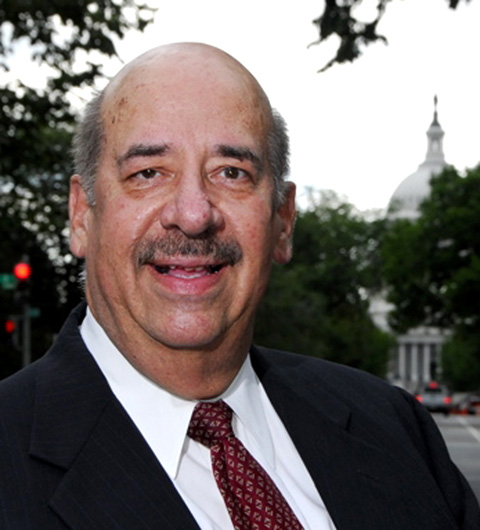

Chickasaw Nation Ambassador to the United States, Charles W. Blackwell died Wednesday, January 2 in Washington D.C., at the age of 70.
Mr. Blackwell was born July 30, 1942 in Concho Indian Hospital in El Reno, Okla.
Chickasaw Nation Governor Bill Anoatubby appointed Mr. Blackwell as a delegate to the United States in 1990. He was named Chickasaw Nation Ambassador to the United States during a 1995 ceremony in Washington D.C.
At the time, he was the first American Indian tribal ambassador to the United States Government.
Chickasaw Nation Governor Bill Anoatubby said that Mr. Blackwell was “a man of vision” who was well suited for the position.
“Charles Blackwell embodied all the best qualities of a diplomat and statesman as the Chickasaw Nation Ambassador to the United States. He brought a tremendous level of wisdom, integrity, knowledge and passion to his duties as our emissary in Washington” said Gov. Anoatubby. “As one who was fortunate enough to call Charles my friend, it is with great sadness that my condolences go out to his family and other close friends. This is a sad day for the entire Chickasaw Nation, as we have lost an irreplaceable friend and unrivaled advocate.”
Gov. Anoatubby said that his decision to appoint Mr. Blackwell as a delegate and later as ambassador to the United States grew out of discussions the two had concerning the need for such a position.
“We agreed that there was a need for the tribes to revive a tradition of diplomatic relations with other governments,” said Gov. Anoatubby. “Appointment of an official ambassador helped to reinforce the formal government-to-government relationship the Chickasaw Nation had with the federal government. Over the years, Charles did a tremendous job of helping that relationship grow and improve.”
Assistant Secretary – Indian Affairs Kevin K. Washburn, also Chickasaw, issued the following statement on the passing of Ambassador Blackwell.
“Today, Indian Country lost a distinguished leader whose eloquence and diplomacy in promoting self-determination for the Chickasaw Nation and all tribes was legendary. As the Chickasaw Nation’s ambassador to the United States, Charles Blackwell personified the nation-to-nation relationship, giving his people a voice at the highest levels of government.”
“Ambassador Blackwell was an accomplished advocate for the Chickasaw people. His forceful personality, generous spirit and guidance on the workings of federal government will be sorely missed by all who had the good fortune to know him. Our prayers go out to his family, the Chickasaw Nation leadership, and the Chickasaw people.”
In addition to serving as the official emissary of the Chickasaw Nation, Mr. Blackwell has also long been a strong advocate for tribal economic development. He is founder of the First American Business Center in Washington, D.C. According the center’s website, Mr. Blackwell “believes that strong independent economies and excellent education systems are necessary for the survival of sovereign tribal nations.”
In 2007 he was awarded the Legacy Award for Lifetime Achievement by the National Director of the U.S. Department of Commerce Minority Business Development Agency.
Ambassador Blackwell has also been a strong advocate for Indian education for many years.
After spending much of his childhood in Tishomingo, Okla. and other small towns in the Chickasaw Nation, Mr. Blackwell earned his law degree from the University of New Mexico in 1972.
After he received his law degree, he worked as a staff attorney at the American Indian Law Center until 1974 and served as Associate Director of the Special Scholarship Program in Law for American Indians until 1977.
During this time, he helped more than 700 American Indians and Alaskan Natives gain entrance into law schools all over the United States.
From 1974 to 1977, he also served as the Assistant Dean and an Adjunct Professor at the University of New Mexico School of Law.
Mr. Blackwell has served on the EPA Director’s National Clean Air Action Advisory Committee. From 1995 to 1997, he served on the Western Governor’s States Drought Coordination Council at the request of the U.S. Secretaries of Commerce, Agriculture, and Interior. In 1997, he was appointed by President Clinton to the Presidential Advisory Council on HIV/AIDS where he served as the only American Indian until 2001.
Mr. Blackwell received his Bachelor of Arts in Education in 1964 from East Central State College in Ada, Oklahoma (now East Central University), where he was the founding president of the Epsilon Omega chapter of Pi Kappa Alpha fraternity, editor of the campus newspaper, and Student of the Year in 1964.
He returned to Ada in 2009 to speak about citizenship in the 21st century during a political science conference at the University.
“There are few people who have the unique understanding of citizenship that he has,” program Chair Christine Pappas said at the time. “Charles Blackwell’s ECU education seems to have propelled him to reach great heights.
It’s an honor to have such a distinguished alum back on campus during our Centennial year.”
Mr. Blackwell has also written a number of columns published in the Chickasaw Times. In one of those, he wrote about the importance of vision.
“Vision is a combination of wisdom, strength, courage, and generosity. Vision provides insight into the past so that you may define your present; vision gives you inspiration on what you want to do with your future. Your vision can bring you happiness, motivation, and self-determination for doing the best with and for yourself, your family and your Chickasaw people.”
